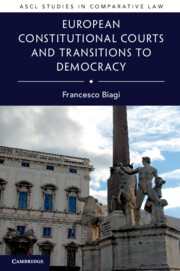Book contents
- European Constitutional Courts and Transitions to Democracy
- ASCL Studies in Comparative Law
- European Constitutional Courts and Transitions to Democracy
- Copyright page
- Dedication
- Contents
- Foreword
- Acknowledgments
- Notes on the Text
- Introduction
- 1 Democratic Transitions and Constitutional Courts
- 2 The First Generation
- 3 The Second Generation
- 4 The Third Generation
- 5 Comparing Three Generations
- Bibliography
- Index
3 - The Second Generation
The Case of the Spanish Constitutional Court
Published online by Cambridge University Press: 05 December 2019
- European Constitutional Courts and Transitions to Democracy
- ASCL Studies in Comparative Law
- European Constitutional Courts and Transitions to Democracy
- Copyright page
- Dedication
- Contents
- Foreword
- Acknowledgments
- Notes on the Text
- Introduction
- 1 Democratic Transitions and Constitutional Courts
- 2 The First Generation
- 3 The Second Generation
- 4 The Third Generation
- 5 Comparing Three Generations
- Bibliography
- Index
Summary
Chapter 3 deals with the Spanish Constitutional Court. In this second generation of constitutional courts there are fewer unknown factors and more instances of courts in other countries to draw inspiration from, including the Italian Constitutional Court. All this contributed to the establishment and consolidation of constitutional justice. In the period from 1980 to the early 1990s, the Spanish Court dealt with four main issues, concerning the normative value of the constitutional provisions, the preconstitutional legislation, fundamental rights, and the territorial organization of the state. From the very beginning, the constitutional court upheld the normative value of all the provisions of the Constitution, and played an important role in determining whether the preconstitutional laws were in conflict with the provisions of the Constitution laying down fundamental rights and freedoms. Moreover, it succeeded in setting up an effective system of protection of fundamental rights, as well as ensuring a rational functioning of the State of Autonomies. The territorial question represented one of the most complex issues to be addressed, and the outcome of the transition to democracy was largely dependent on this matter.
Keywords
- Type
- Chapter
- Information
- European Constitutional Courts and Transitions to Democracy , pp. 87 - 133Publisher: Cambridge University PressPrint publication year: 2020

